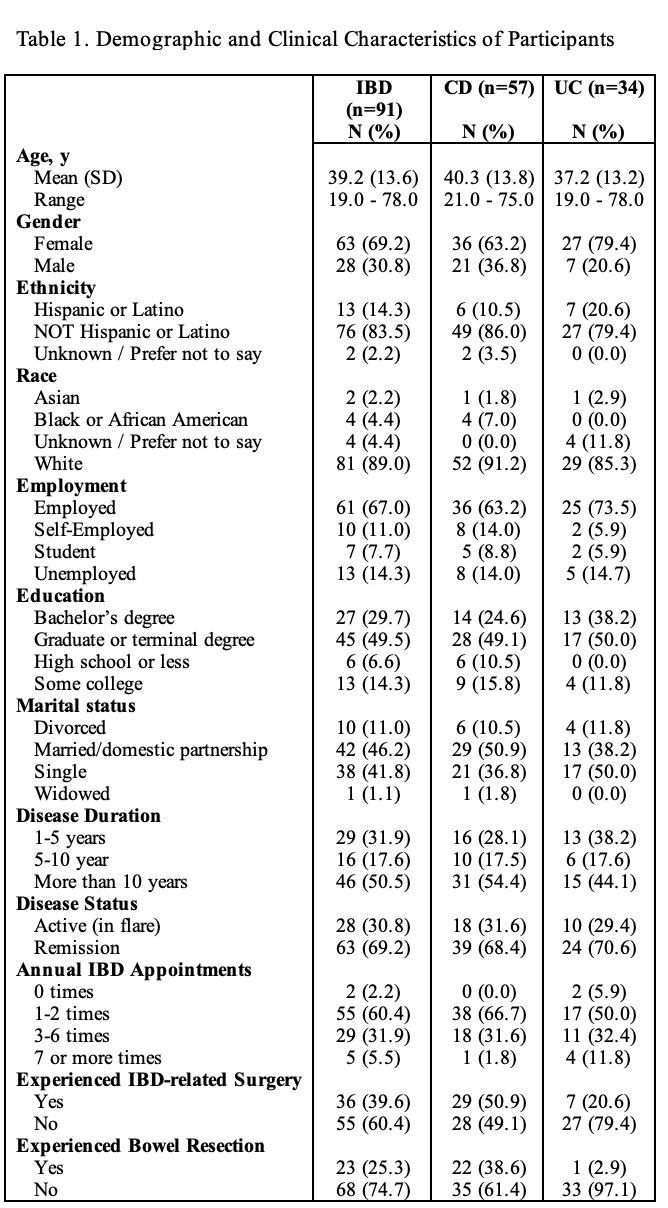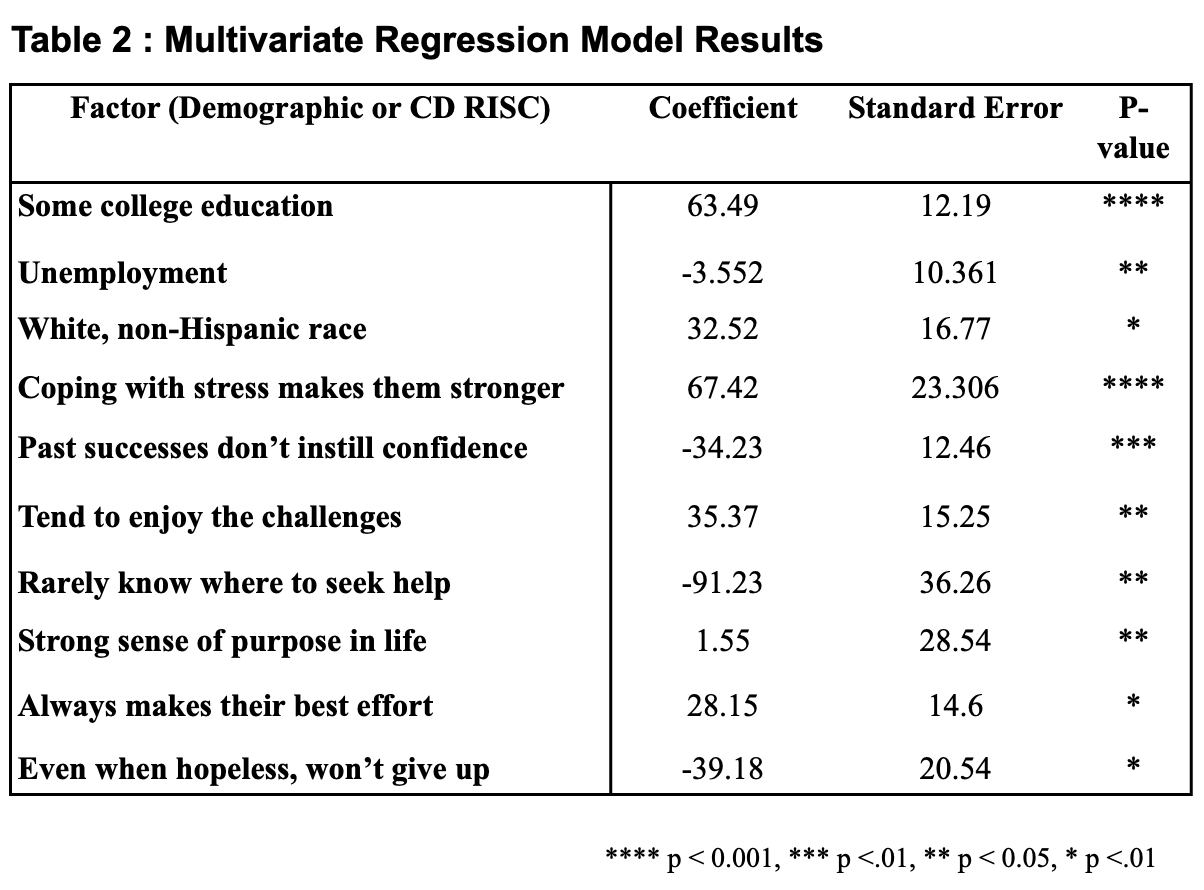Monday Poster Session
Category: IBD
P3254 - Psychological Resilience Predicts Disease-Specific Metrics in Patients With Inflammatory Bowel Disease
Monday, October 27, 2025
10:30 AM - 4:00 PM PDT
Location: Exhibit Hall

Wamia Siddiqui, BS (she/her/hers)
Icahn School of Medicine at Mount Sinai
New York, NY
Presenting Author(s)
Wamia Siddiqui, BS, Michelle Mendiolaza, PhD, Laurie Keefer, PhD, FACG
Icahn School of Medicine at Mount Sinai, New York, NY
Introduction: Inflammatory Bowel Disease (IBD), including Crohn’s Disease and ulcerative colitis (UC), is a complex and common chronic condition. Psychological resilience has been linked to fewer disease flare-ups, lower rates of surgical intervention, and improved patient satisfaction. This study seeks to characterize psychological resilience as a predictor of IBD-specific quality of life (QoL) outcomes.
Methods: A cross-sectional survey was administered at a tertiary IBD center (Sept–Dec 2023). Resilience was assessed using the Connor-Davidson Resilience Scale (CD-RISC), and quality of life was measured using the Inflammatory Bowel Disease Questionnaire (IBDQ), which evaluates bowel, emotional, systemic, and social domains.
Results: Of the 91 respondents (mean age 39; 70% female), 58.9% were diagnosed with Crohn’s disease and 35.6% with ulcerative colitis; over half had lived with IBD for more than 10 years. Participants were stratified by resilience level, with 55.5% classified as low resilience based on first quartile CDRISC scores. Patients in the low resilience cohort had lower QoL, including worse bowel-related symptoms (p = 0.07), and feeling depressed or discouraged (p=0.072). Conversely, high-resilience patients experienced significantly fewer systemic symptoms (p=0.036, d=0.46), with more energy (p=0.035), less emotional distress (p=0.005), and greater personal satisfaction (p=0.002). In multivariate regression, several CD-RISC items significantly predicted overall QoL, including positive coping style (β=67.4, p< 0.001), and enjoyment of challenges (β=35.4, p=0.02). Socioeconomic factors such as educational attainment (β=63.5, p< 0.001) and unemployment (β=−3.55, p=0.02) were also significant predictors. The final model accounted for 52.2% of the variance in IBDQ scores (adjusted R² = 0.522, F(35,51) = 3.69, p< 0.001), indicating that over half of the variability in disease-specific QoL could be accounted for by resilience-related and sociodemographic predictors.
Discussion: Psychological resilience has an independent positive association with improved disease-specific quality of life outcomes in patients with IBD. These findings underscore the importance of incorporating resilience screening and assessment into clinical IBD management and highlight potential targets for psychosocial intervention.

Figure: Table 1: Demographic and Clinical Characteristics of Survey Participants

Figure: Figure 2: Summary of the Multivariate Regression Model Results
Disclosures:
Wamia Siddiqui indicated no relevant financial relationships.
Michelle Mendiolaza indicated no relevant financial relationships.
Laurie Keefer: AbbVie – Consultant. Ardelyx – Consultant. Eli Lilly – Consultant. Janssen – Consultant. Pfizer – Consultant. Reckitt Health – Consultant. Trellus Health – Owner/Ownership Interest, Stock-publicly held company(excluding mutual/index funds).
Wamia Siddiqui, BS, Michelle Mendiolaza, PhD, Laurie Keefer, PhD, FACG. P3254 - Psychological Resilience Predicts Disease-Specific Metrics in Patients With Inflammatory Bowel Disease, ACG 2025 Annual Scientific Meeting Abstracts. Phoenix, AZ: American College of Gastroenterology.
Icahn School of Medicine at Mount Sinai, New York, NY
Introduction: Inflammatory Bowel Disease (IBD), including Crohn’s Disease and ulcerative colitis (UC), is a complex and common chronic condition. Psychological resilience has been linked to fewer disease flare-ups, lower rates of surgical intervention, and improved patient satisfaction. This study seeks to characterize psychological resilience as a predictor of IBD-specific quality of life (QoL) outcomes.
Methods: A cross-sectional survey was administered at a tertiary IBD center (Sept–Dec 2023). Resilience was assessed using the Connor-Davidson Resilience Scale (CD-RISC), and quality of life was measured using the Inflammatory Bowel Disease Questionnaire (IBDQ), which evaluates bowel, emotional, systemic, and social domains.
Results: Of the 91 respondents (mean age 39; 70% female), 58.9% were diagnosed with Crohn’s disease and 35.6% with ulcerative colitis; over half had lived with IBD for more than 10 years. Participants were stratified by resilience level, with 55.5% classified as low resilience based on first quartile CDRISC scores. Patients in the low resilience cohort had lower QoL, including worse bowel-related symptoms (p = 0.07), and feeling depressed or discouraged (p=0.072). Conversely, high-resilience patients experienced significantly fewer systemic symptoms (p=0.036, d=0.46), with more energy (p=0.035), less emotional distress (p=0.005), and greater personal satisfaction (p=0.002). In multivariate regression, several CD-RISC items significantly predicted overall QoL, including positive coping style (β=67.4, p< 0.001), and enjoyment of challenges (β=35.4, p=0.02). Socioeconomic factors such as educational attainment (β=63.5, p< 0.001) and unemployment (β=−3.55, p=0.02) were also significant predictors. The final model accounted for 52.2% of the variance in IBDQ scores (adjusted R² = 0.522, F(35,51) = 3.69, p< 0.001), indicating that over half of the variability in disease-specific QoL could be accounted for by resilience-related and sociodemographic predictors.
Discussion: Psychological resilience has an independent positive association with improved disease-specific quality of life outcomes in patients with IBD. These findings underscore the importance of incorporating resilience screening and assessment into clinical IBD management and highlight potential targets for psychosocial intervention.

Figure: Table 1: Demographic and Clinical Characteristics of Survey Participants

Figure: Figure 2: Summary of the Multivariate Regression Model Results
Disclosures:
Wamia Siddiqui indicated no relevant financial relationships.
Michelle Mendiolaza indicated no relevant financial relationships.
Laurie Keefer: AbbVie – Consultant. Ardelyx – Consultant. Eli Lilly – Consultant. Janssen – Consultant. Pfizer – Consultant. Reckitt Health – Consultant. Trellus Health – Owner/Ownership Interest, Stock-publicly held company(excluding mutual/index funds).
Wamia Siddiqui, BS, Michelle Mendiolaza, PhD, Laurie Keefer, PhD, FACG. P3254 - Psychological Resilience Predicts Disease-Specific Metrics in Patients With Inflammatory Bowel Disease, ACG 2025 Annual Scientific Meeting Abstracts. Phoenix, AZ: American College of Gastroenterology.
